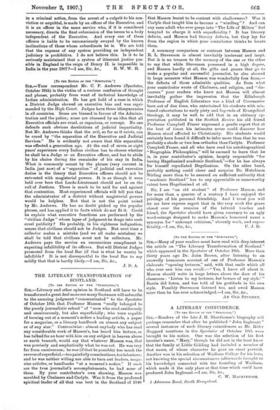LTO THE EDITOR OP THE "SPECTATOR."]
SIB,—Your correspondent Mr. C. F. Andrews (Spectator, October 26th) is the victim of a curious confusion of thought and phrase, probably from want of technical knowledge of Indian administration. He has got hold of a case in which a District Judge showed an executive bias and was repri- manded by the High Court. Judges have these idiosyncrasies in all countries. Some are biassed in favour of the Adminis- tration and the police; some are obsessed by an idea that all Executive officials are cruel, or rapacious, or corrupt. No one defends such obvious derelictions of judicial impartiality. But Mr. Andrews thinks that the evil, so far as it exists, can be cured by "the separation of the Executive and Judicial Services." He is evidently not aware that this separation was effected a generation ago. At the end of seven or eight years' experience every Indian civilian has to choose whether he shall be a Judge or an Executive officer, and has to abide by his choice during the remainder of his stay in India. What is commonly meant by the phrase (very current in India just now) of a " separation " of judicial and executive duties is the theory that Executive officers should not be entrusted with magisterial powers. It is as though it were held over here that Lords-Lieutenant should not be on the roll of Justices. There is much to be said for and against that contention. Most experienced officials will tell you that the administrator of a district without magisterial powers would be helpless. But that is not the point raised by Mr. Andrews. He has no doubt picked up the popular phrase, and has applied it to facts which do not fit it. Could he explain what executive functions are performed by the "civilian Judge" whose lapse of judgment he drags into such cruel publicity ? He probably, in his righteous indignation, means that civilians should not be Judges. But next time a collecfor makes a mistake (and we all make mistakes) we shall be told that civilians must not be collectors. Mr. Andrews pays the service an unconscious compliment in expecting infallibility of its officers. But will District Judges promoted from the local Bar (if that is what he wants) be infallible ? It is not disrespectful to the local Bar to say mildly that that is hardly likely.—I am, Sir, &c., J. D. A.






























































 Previous page
Previous page